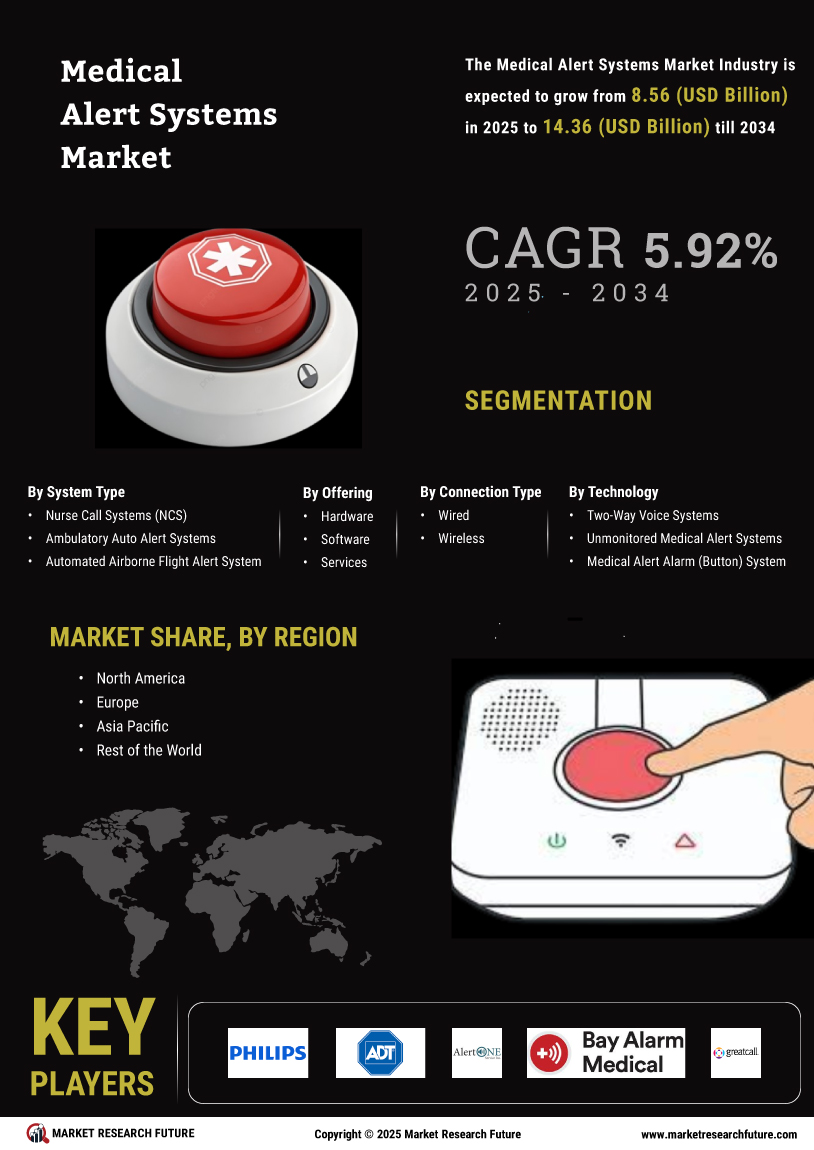Aging Population
The Global Medical Alert Systems Market Industry is experiencing growth driven by the increasing aging population worldwide. As individuals age, they often face health challenges that necessitate immediate assistance. By 2024, the market is projected to reach 8.08 USD Billion, reflecting the rising demand for medical alert systems among seniors. This demographic shift indicates a growing need for reliable emergency response solutions, as older adults seek to maintain independence while ensuring their safety. The integration of advanced technologies in these systems further enhances their appeal, making them essential for elderly care.
Market Growth Projections
The Global Medical Alert Systems Market Industry is projected to experience substantial growth in the coming years. By 2024, the market is expected to reach 8.08 USD Billion, with further growth anticipated to 15.2 USD Billion by 2035. This growth trajectory indicates a compound annual growth rate (CAGR) of 5.92% from 2025 to 2035. Such projections reflect the increasing demand for medical alert systems driven by factors such as an aging population, technological advancements, and rising health awareness. This positive outlook underscores the potential for innovation and investment in the medical alert systems sector.
Technological Advancements
Technological advancements play a pivotal role in shaping the Global Medical Alert Systems Market Industry. Innovations such as mobile applications, wearable devices, and smart home integration are enhancing the functionality of medical alert systems. These advancements not only improve user experience but also increase the reliability of emergency alerts. As the market evolves, the incorporation of features like fall detection and GPS tracking becomes more prevalent. This trend is likely to attract a broader consumer base, contributing to the market's projected growth to 15.2 USD Billion by 2035, with a CAGR of 5.92% from 2025 to 2035.
Government Initiatives and Support
Government initiatives and support for healthcare technologies are fostering growth in the Global Medical Alert Systems Market Industry. Various countries are implementing policies that encourage the adoption of medical alert systems, particularly for the elderly population. These initiatives often include funding programs and subsidies aimed at improving access to healthcare technologies. Such support not only enhances the affordability of medical alert systems but also raises awareness about their benefits. As a result, the market is poised for significant expansion, with projections indicating a rise to 15.2 USD Billion by 2035, driven by favorable regulatory environments.
Rising Incidence of Chronic Diseases
The rising incidence of chronic diseases globally is a crucial driver for the Global Medical Alert Systems Market Industry. Chronic conditions such as heart disease, diabetes, and respiratory disorders necessitate continuous monitoring and immediate medical intervention. As the prevalence of these diseases increases, so does the need for reliable medical alert systems that can provide timely assistance. This demand is reflected in the market's expected growth to 15.2 USD Billion by 2035. The integration of health monitoring features within alert systems may further enhance their value, making them indispensable for individuals managing chronic health issues.
Increased Awareness of Health and Safety
Increased awareness of health and safety issues among consumers is significantly influencing the Global Medical Alert Systems Market Industry. As individuals become more conscious of the importance of immediate medical assistance, the demand for alert systems rises. This heightened awareness is particularly evident among families of elderly individuals who prioritize safety and security. The market's growth trajectory, reaching 8.08 USD Billion in 2024, suggests that consumers are actively seeking solutions that provide peace of mind. This trend is likely to continue, as educational campaigns and community programs promote the benefits of medical alert systems.

















